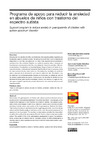Please use this identifier to cite or link to this item:
https://accedacris.ulpgc.es/jspui/handle/10553/72702
| Title: | Programa de apoyo para reducir la ansiedad en abuelos de niños con trastorno del espectro autista | Other Titles: | Support program to reduce anxiety in grandparents of children with autism spectrum disorder | Authors: | Fortea Sevilla, María del Sol Castro Sánchez, José Juan Escandell Bermúdez, María Olga |
UNESCO Clasification: | 32 Ciencias médicas 6108 Psicología de la vejez 6102 Psicología del niño y del adolescente |
Keywords: | Families State Autism Spectrum Disorders School Of Families Anxiety, et al |
Issue Date: | 2019 | Journal: | Revista Espanola De Discapacidad-Redis | Abstract: | Introduction: the grandparents of children with autism spectrum disorders show a double concern; because their grandson "will not be like others", and because of the impact of the diagnosis on their children, the children's parents. This situation generates anxiety and changes in daily living. Objective: assess anxiety before and after attending a family school, and quality of life in grandparents. Method: the State-Trait Anxiety Inventory is administered at the beginning and at the end of the family school, and the Family quality of Life Survey at the end. The school consists of five sessions of two hours each. The results of anxiety before and after the intervention as well as the quality of life are analyzed. Results: there's a drop in state anxiety after school. The quality of life of the participating grandparents is good. Conclusions: family schools are an effective tool to decrease anxiety. It offers grandparents a meeting place to share experiences and receive real information about autism spectrum disorders. Introducción: los abuelos de niños con trastornos del espectro autista muestran una doble preocupación; porque su nieto “no será como los demás” y por el impacto del diagnóstico en sus hijos, los padres de los niños. Esta situación genera ansiedad y cambios en la vida cotidiana. Objetivo: se evalúa la ansiedad antes y después de la asistencia a una escuela de familia, y la calidad de vida en los abuelos. Método: se administra el Cuestionario de Ansiedad Estado-Rasgo al inicio y al final de la escuela de familias, y la Escala de Calidad de Vida Familiar al final. La escuela consta de cinco sesiones de dos horas cada una. Se analizan los resultados de ansiedad antes y después de la intervención así como la calidad de vida. Resultados: hay un descenso de la ansiedad-estado después de la escuela. La calidad de vida de los abuelos participantes es buena. Conclusiones: las escuelas de familia son una herramienta eficaz para disminuir ansiedad. Ofrece a los abuelos un lugar de reunión para compartir experiencias y recibir información real sobre los trastornos del espectro autista. |
URI: | https://accedacris.ulpgc.es/handle/10553/72702 | ISSN: | 2340-5104 | DOI: | 10.5569/2340-5104.07.02.07 | Source: | Revista española de discapacidad-Redis [ISSN 2340-5104], v. 7 (2), p. 123-137, (Diciembre 2019) |
| Appears in Collections: | Artículos |
WEB OF SCIENCETM
Citations
3
checked on Jun 8, 2025
Page view(s)
747
checked on Dec 7, 2024
Download(s)
354
checked on Dec 7, 2024
Google ScholarTM
Check
Altmetric
Share
Export metadata
Items in accedaCRIS are protected by copyright, with all rights reserved, unless otherwise indicated.
